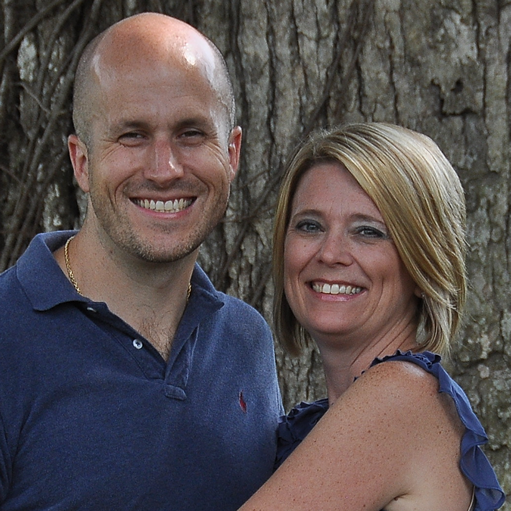Sheila Wray Gregoire's Blog, page 199
October 16, 2014
This One Tip Revolutionized Our Marriage
 Today, welcome Kyle Gabhart, author of The Phoenix Marriage, who wanted to share how to revolutionize your marriage. His experiential story will change how you see your spouse!
Today, welcome Kyle Gabhart, author of The Phoenix Marriage, who wanted to share how to revolutionize your marriage. His experiential story will change how you see your spouse!One weekend in February of 2013, my wife and I attended a weekend marriage conference that rocked our world. The workshop was presented by Dr. David and Teresa Ferguson at our local church. We had so many amazing realizations that weekend, but one of those stands out more than any other. Dr Ferguson walked the couples through a simple visualization exercise:
Imagine you are sitting next to God and both of you are gazing a short distance away toward your mate. Rather than seeing him or her as your spouse, try to imagine what God sees – His child. Uniquely created for a divine purpose, He has cared for and nurtured this child for years. Now ask Father God what He loves about His child. What is it about him or her that delights the Father? What special qualities has He uniquely placed within him or her and why did He choose this person to be your soul’s mate?
This simple exercise transformed our marriage. Our physical eyes that saw only chores and bills and schedules were exchanged for spiritual eyes to see one another with grace, compassion, and love.
How do you see your mate?
If your marriage is anything like ours used to be, you likely see your spouse in terms of his or her function. Your mate is a partner that helps with chores, finances, logistics with the kiddos, and makes sure you never have to go alone to the movies. While all of those are true, they only scratch the surface. All of those functional elements are generic qualities which would be applicable to anyone operating in the role of husband or wife. Beneath that surface layer is someone specially crafted to share a life and a mission with you. Yet, losing sight of this truth is so easy to do.
What does God see?
“The LORD does not look at the things people look at. People look at the outward appearance, but the LORD looks at the heart.” -I Samuel 16:7 (NIV)
God sees His son or His daughter. He sees a precious child whom He uniquely endowed with talents and capabilities. Your spouse didn’t come from a mold. There was no factory assembly line. This was a custom job for a specific purpose. God lovingly crafted your husband or wife and chose to trust you with loving this person for the rest of your life. Before the two of you even met, He was delighting in this person every day. Long before the two of you said your vows, He was weeping over your mate’s failures and celebrating each success. He LOVES your mate unconditionally. Do you?
Honor your mate
“Commit your work to the Lord, and your plans will be established. The Lord has made everything for its purpose.” -Proverbs 16:3-4 (ESV)
The Lord has made EVERYTHING for its purpose, your spouse included. Those qualities that annoy you most, may actually be a side effect of the unique gifts that your spouse has been blessed with by God! My wife sometimes gets frustrated by my absent-mindedness. But this is just a natural side effect of being a thoughtful and introspective person. These are the very same qualities that I use in ministering to her heart and shepherding marriages on a daily basis! Likewise, I tend to get aggravated by Tammy’s insistence that we leave on time to get to places we need to go, and yet it’s this very quality that makes her so invaluable to managing our crazy family of eight!
Commit to honoring your mate. If one or more qualities bother you, ask God to help you see why He created them that way. Chances are, you’re missing out on an incredible aspect of your spouse. Then once you discover it, commit to celebrating this quality of your mate and praise them for it. The dynamic of your relationship will radically change when you honor your mate’s uniqueness by seeing them the way Jesus does.
Kyle Gabhart is a devoted husband and father of 6. He is also a blogger, public speaker, entrepreneur, and author of the the newly released The Phoenix Marriage. He and his wife Tammy, founded Equip Your Marriage, a faith-based ministry dedicated to empowering, equipping, and restoring marriages. Kyle is an avid soccer player and board game enthusiast, but he prides himself on being a constant embarrassment to his children.
WEBSITE: Equip Your Marriage
BOOK: Phoenix Marriage

The post This One Tip Revolutionized Our Marriage appeared first on To Love, Honor and Vacuum.
Related posts on To Love, Honor and Vacuum:
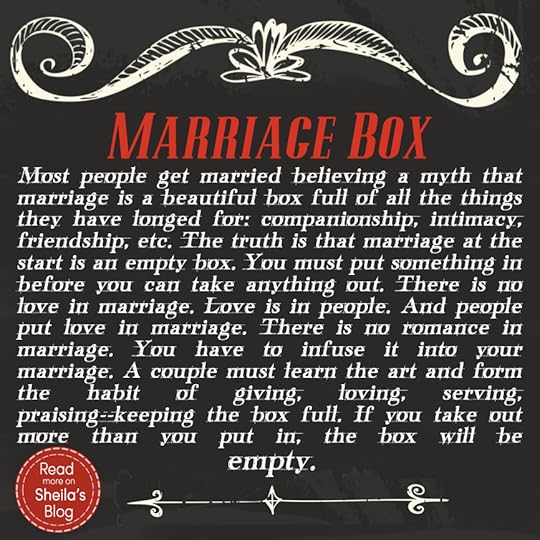 Marriage Box
Marriage Box How to Reset a Bad Marriage Day
How to Reset a Bad Marriage Day Revive Your Marriage: Revive Your Attitude
Revive Your Marriage: Revive Your Attitude




October 14, 2014
A Peek Inside a Blogger’s Marriage
 I’m on the road right now (well, technically I’m in the air) traveling to Colorado! If you live in the state, come and meet me! Details of where I’ll be when are here. So I didn’t have time to write a post today. I have a contest I wanted to announce, but it will have to wait until next Tuesday. Instead, I wanted to share this lovely guest post from Emily Wierenga, author of the touching memoir Atlas Girl, giving us a peek inside her marriage.
I’m on the road right now (well, technically I’m in the air) traveling to Colorado! If you live in the state, come and meet me! Details of where I’ll be when are here. So I didn’t have time to write a post today. I have a contest I wanted to announce, but it will have to wait until next Tuesday. Instead, I wanted to share this lovely guest post from Emily Wierenga, author of the touching memoir Atlas Girl, giving us a peek inside her marriage.
The other night we left the boys with my sister, rented a hotel room in the mountains. We planned to snowboard the next day.
We bought some beer and take-out and I couldn’t rest that night. For hours, we lay there in our separate beds because the room came with two, but I couldn’t sleep. And I cried.
Trent stretched out his hand across the space between our beds, his fingers reaching for me in the dark. “Hold on to me, Em,” he said. “I’m here.”
“Hold on to me, Em. I’m here.”
We’re not exactly John and Yoko.
Trent’s a math geek and I’m a literary nerd. He’s loud and I’m quiet. He’s athletic and I run into walls. We both like books. We both love camping. And we’re both over-the moon crazy about each other and our boys.
But marriage has come hard for us.
Hard, with years of anorexia and insomnia and fists punching the wall.
I’m putting away the laundry, the seven loads which Trent folded for me while playing a computer game, because between my books and my boys, I can’t seem to take a shower or do any house cleaning. Let alone fold the laundry.
And I’m putting the baskets away when he calls “Suppertime,” because Trent’s made burgers, and on the table, a salad: with peppers and grated Jalapeno cheese, lettuce, bacon bits, and grated carrot, and chopped onions which always make Trent cry–it’s the only time I see him cry– and “I made you fancy salad,” he says.
Like my friend says, there’s nothing sexier than a salad-making man.
But truth is I’d be a wreck without my salad-making man.
The one who held me those long, skinny anorexia years.
Our best conversations happen over a board game because games are Trent’s love language, and we’re still getting the intimacy thing.
I used to fight him when I got mad, sometimes with my fists, and he’d shake his head and grab my wrists and then finally leave. Slam the door and drive off while I wept into the couch pillows, but that doesn’t happen anymore.
No man is perfect, and Trent will say things that unintentionally hurt me, or he’ll forget to take out the trash, but I will also do things–like forget his birthday, as I did one year–and ours is the kind of marriage that throbs with love.
Ours is the kind of marriage that throbs with love.
The kind of love that will not give up: not through anorexia, not through insomnia, not through moves to Korea or moves home to take care of parents with cancer, not through slammed doors or tears or fists, because there’s also the salad. There’s the laundry. There’s Trent taking the kids to his parents so I can write. There’s him reaching out in the dark to hold me, to pray for me.
I want the kind of marriage that dances into its Golden Anniversary, that kisses each other on wrinkled cheeks and laughs at each other’s jokes long after the sun has wound down.
I want the kind of marriage that dances into its Golden Anniversary.
And maybe the secret is to never stop reaching out in the dark. To never stop taking hold of each other’s hands. And to never let go.
Not even for a moment.
Emily Wierenga is a blogger and the author of several books, including her touching memoir Atlas Girl about her struggle with anorexia and figuring out where she fits in this world. She’s an artist, a writer, a mother, and a lover. You can find her at http://emilywierenga.com.
The post A Peek Inside a Blogger’s Marriage appeared first on To Love, Honor and Vacuum.
Related posts on To Love, Honor and Vacuum:
 7 Things Marriage Bloggers Want You to Know
7 Things Marriage Bloggers Want You to Know 4 Kinds of Talk You Need in a Marriage
4 Kinds of Talk You Need in a Marriage Bloggers are People, Too
Bloggers are People, Too



October 13, 2014
Thanksgiving Thoughts
It’s Thanksgiving here in Canada, so I’m going to take the day off of blogging to drive to Ottawa and make dinner for my daughter, her boyfriend, and her roommate. I’m looking forward to seeing them! So forgive my lack of a new post.
Then tomorrow I fly out to Colorado Springs to do some work with Focus on the Family and to speak in Denver on Wednesday morning. If you’re in the Colorado area, I’d love to see you! Here’s information on where I’m speaking in Denver and a meetup I’m planning for Colorado Springs.
In the meantime, I posted this on Facebook the other day and I’ve been thinking about it a lot.
I love the sentiment, but I don’t know that it’s always that easy. It seems to me as I go through people’s emails and read the comments that tough times DO last–in a way. The immediate pain goes away, and you’re able to smile again and get through the day. But hurts we suffer come with us. God heals much, but some pain is always there. I’m not sure it’s supposed to be different–as Laura Story said in her song Blessings, maybe these tough times give us a thirst that this world can’t satisfy. They point us to heaven.
I know some of you are walking through tough times in your marriage, and I want to reassure you that the aching pain won’t last. It really won’t. And it does make you stronger, and it can bring you together. And when you decide to cling to each other in tough times, you forge such a strong bond.
But some pain does stay, and that’s the nature of life. Perhaps, though, that’s okay, because it gives us a sense of the joy of heaven.
That’s what I’m thinking this Thanksgiving. I’m so grateful for everything that God has brought me through, and it’s made me into a tough person. But there will always be some aches, and I’m at peace with that. Because it makes me even more grateful that this world is not all there is.
A few more things for today:
These posts are being shared quite a bit this week. If you haven’t seen them, you may want to take a look:
My 7 Pet Peeves About How We Do Music in Church
Should We Stop Using the Term Virgin?
The 50 Best Bible Verses to Memorize
And to all my Canadian readers, Happy Thanksgiving! To everyone else, have a wonderful day, and come on back tomorrow for the launch of an exciting contest!

The post Thanksgiving Thoughts appeared first on To Love, Honor and Vacuum.
Related posts on To Love, Honor and Vacuum:
 Thanksgiving Looking Forward
Thanksgiving Looking Forward Some Weekend Links
Some Weekend Links 7 Thoughts that Will Change Your Marriage
7 Thoughts that Will Change Your Marriage



October 11, 2014
Some Weekend Links
It’s Thanksgiving in Canada, and I’m getting ready for two turkey dinners! One at my aunt’s, and then a small one at my daughter’s in Ottawa with her boyfriend and her best friend. Just the four of us–three university students who crave a good meal, and me!
In honour of Thanksgiving, let me share this one video that is my favourite of all time (#70skids)
In all seriousness, though, as my girls get older and move on with their lives, I am deeply thankful to God that they both have faith, and that they both have sought out friends who also have faith. And with the chaos in the world today, I am so grateful and thankful for my country as well.
I’ll Be in Colorado This Week!
I’m coming to Colorado Springs this week to film some things for Focus on the Family, and if you’re in Colorado, I’d love to meet you! Here’s how:
Wednesday, 9:15 a.m., Bethany Lutheran Church near Denver (4500 E Hampden Ave, Cherry Hills Village)
I’ll be at their MOPS meting giving my signature Girl Talk! Come on by if you’re in the area. Join the Facebook Event here!
Thursday, 7:30 p.m., Meet-up at In the Moo Self-Service Frozen Yogurt, Colorado 105, Monument.
If you’re in the Colorado Springs/Monument area, I’ll be dropping by In The Moo for some frozen yogurt. Come on by! I’d love to meet you–and have you meet other women who read To Love, Honor and Vacuum!
And Now, for something more serious….
So I’m sure you’ve all heard about those celebrity nude photo hacks. Really sad. Actress Jennifer Lawrence said,
I was in a loving, healthy, great relationship for four years. It was long distance, and either your boyfriend is going to look at porn or he’s going to look at you.
That made me really sad. It assumes that everyone will look at porn. It ignores the effects of porn. And as I’ve said before, you can’t defeat porn by becoming porn. The problem isn’t porn itself; it’s what porn does to you, and how it messes up your arousal process and your idea of intimacy.
Another thing for all of you women who have ever thought, “if only I were prettier he wouldn’t be tempted to look at porn”. We’re talking about Jennifer Lawrence! So once again, proof that porn use is not about you; it’s about a compulsion, and it needs to stop.
Can You Help Covenant Eyes in their Fight Against Porn (and get paid for it!)?
 Covenant Eyes is a great resource that helps with internet accountability. You can install it on all your devices, and then it sends an email to a person of your choice if someone tries to access a site that isn’t good.
Covenant Eyes is a great resource that helps with internet accountability. You can install it on all your devices, and then it sends an email to a person of your choice if someone tries to access a site that isn’t good.
Thy want to improve their service, and so they’re seeking feedback from married women with children. Here are three ways you can participate:
Fill out a survey
Incentive: Special e-book bundle from Covenant Eyes
Plus, a chance to win a $50 Amazon gift card in a raffle!
Must be completed by October 24
Test a part of the Covenant Eyes website. This interview should take 15 to 30 minutes.
Incentive: a $15 Amazon gift card for completing the interview
Plus, free Covenant Eyes software for your family for three months while you participate in the Market Research
Must let Covenant Eyes know by October 15th to participate. Email Leigh Seger if you’d like to.
Single question e-mails. Simply respond by e-mail to the question-of the-day for a week. Covenant Eyes will e-mail you the questions.
Incentive: a $25 Amazon gift card
Takes place from October 20 – 24
Interviews are conducted by the Covenant Eyes User Experience department to:
Find out how people use Covenant Eyes software/website.
Find problems that users have with the software/website.
Give out gift cards from Amazon to thank people for offering their opinions and time (Now that’s fun!).
If you would like to participate in any of these offers, please e-mail Leigh Seger and she will provide you with additional details to participate.
If porn is a struggle in your marriage, don’t forget to follow my “Dealing with Porn in Your Marriage” Pinterest board!

The post Some Weekend Links appeared first on To Love, Honor and Vacuum.
Related posts on To Love, Honor and Vacuum:
 How I Messed Up–and Some Great Weekend Links!
How I Messed Up–and Some Great Weekend Links! Weekend Links, Winners, and Other Cool Stuff!
Weekend Links, Winners, and Other Cool Stuff! Some Fun–and Interesting–Weekend Links
Some Fun–and Interesting–Weekend Links



October 10, 2014
A Little Higher Than the Squirrels
 Squirrels are nature’s little speedbumps, my daughter likes to say.
Squirrels are nature’s little speedbumps, my daughter likes to say.This time of year it’s a pretty apt description, with all the plump squirrels scampering to and fro fervently collecting food for the winter. They’re bulking up, so they’re a tad slower when cars rush by.
A few farmers have told me recently that we should be paying closer attention to these hyperactive rodents. They seem to be gathering more than usual, signalling that we’re in for a bad winter. Animals, you see, operate on instinct. They know when it’s time to gather, and when it’s time to sleep, or mate, or fight. It’s all hardwired.
That’s why animals are mostly concerned with the here and now.
Their goal in life—in as much as they’re able to make goals—is to get all their physical needs met. And by and large, they instinctually know how to do that.
People, on the other hand, have to be taught. Then, even when we are taught, we have the capacity to refuse. We can act in ways diametrically opposed to our well-being. We can be stupid. We can be selfish. We can even be noble, something most animals, with the exception of a few dogs, aren’t able to do. That’s what makes us essentially human: we have a choice. And because of that, we have the capacity to actually be good and to choose to do what’s right.
So let’s do a thought experiment. When you sit with your mother who has Alzheimer’s, even when she can’t recognize you, are you closer to a human or a reptile? On the other hand, when you leave your baby with a baby-sitter you hardly know so you can party at the bar, are you closer to a chimp or to Mother Teresa? When you stick with your marriage vows, even during the rocky times, I think you’re being human. When you have an affair because you feel like it, and betray your kids and your spouse in the process, you’re being a lizard, a rhino, or a baboon.
When we decide that our lives are all about our appetites—eating more and better food, getting more and better sex, having more and more fun—are we not becoming mere animals?
There’s nothing wrong with the fun things in life, of course, but if we deliberately ignore our responsibilities, or betray our commitments, in order to get those appetites filled, then the character of humanity isn’t advancing. We’re regressing.
A few centuries ago people had to work hard in order to survive. The rock fences that dot the countryside in my native Ontario hometown are standing monuments to the effort that farmers of old had to put in to clear their fields just to be able to plant. You worked, or you did not eat.
Today we have the freedom to be far lazier and far more self-centred than people did when work was a necessity to life. Our basic needs are much more easily met. And yet that also means that we have the opportunity to be even more human. When we choose to do what is right, to work with integrity, or to honour our commitments, even when we don’t have to, then we grow as people.
Unfortunately, I’m not sure those kinds of decisions are really honoured. Our society celebrates lavish lifestyles and the baser instincts rather than integrity, responsibility, and generosity. Too often we’re just living for the moment and doing what makes us feel good, rather than thinking about our character. In so doing, I think we’re losing what makes us human. We are, after all, a little higher than the squirrels. It’s time we remembered that, before life runs us over.

The post A Little Higher Than the Squirrels appeared first on To Love, Honor and Vacuum.
Related posts on To Love, Honor and Vacuum:
 We Need a New Mating Ritual
We Need a New Mating Ritual The Good, the Noble, and the Heroic
The Good, the Noble, and the Heroic Wifey Wednesday: Understanding the Higher Drive Spouse: Bread or Tomatoes?
Wifey Wednesday: Understanding the Higher Drive Spouse: Bread or Tomatoes?



October 9, 2014
Something a Screen Can’t Do: Hug Your Child
 Samantha is a fifth-grader whose family recently moved to a new community. “It’s been hard this year, moving and having to make new friends,” said Samantha. When she was asked if she ever felt as if her parents didn’t love her because they took her away from her old town, she said, “Oh no, I know they love me, because they always give me lots of extra hugs and kisses.”
Samantha is a fifth-grader whose family recently moved to a new community. “It’s been hard this year, moving and having to make new friends,” said Samantha. When she was asked if she ever felt as if her parents didn’t love her because they took her away from her old town, she said, “Oh no, I know they love me, because they always give me lots of extra hugs and kisses.”
Like many children, Samantha’s love language is physical touch*; those touches make her feel secure and let her know that mom and dad love her. The language of touch isn’t confined to a hug or a kiss but includes any kind of physical contact. Even when you are busy, you can often gently touch your child on her back, arm, or shoulder. Although this love language is very easy to express, studies indicate that many parents touch their children only when it is necessary: when they are dressing or undressing them, putting them in the car, or carrying them to bed. It seems that many parents are unaware of how much their children need to be touched and how easily they can use this means to keep their children’s emotional tanks filled with love.
A man named Bob has two children in elementary school and one in preschool. When the two older kids were younger, Bob would often put them in his lap and read them a bedtime story. Reading together builds a sense of oneness, a sense of love for kids. But life got busier and nowadays, the older kids read on their own and his youngest daughter Lisa, four, is used to reading children’s books on an e-reader. Bob rarely puts Lisa on his lap to read Goodnight Moon. She sits by herself on the couch reading with her device.
An electronic reader may save space, trees, and be convenient, but using one with kids short circuits something important – physical touch between a parent and child.
Sure a parent can put a child on his lap and read an e-reader or play a video game together on a tablet. But typically, when a child is engaged with a screen, he or she is not touching a parent. He’s not being held in a lap. He’s not sitting close enough to touch mom or dad’s leg. When family members get used to engaging with screens, they lose the physical touch dynamic which should be a normal dynamic in a healthy family.
If your child’s primary love language is touch, you will know it. They will be jumping on you, poking you, and constantly trying to sit beside you. I believe my youngest daughter Lucy, age 4, has physical touch as her primary love language because she always wants to sit next me and one of her favorite words is “Huggie!” She tells me every day to scratch her back, and the first thing she does in the morning is come in my room for her hug.
When you put your arm around your child, wrestle, or give him a high-five, you’re communicating your love and interest in being together.
Physical touch communicates love in a powerful way to all children, not just young children. Throughout elementary school, middle school, and high school, your child still has a strong need for physical touch. A hug given as he leaves each morning may be the difference between emotional security and insecurity throughout the day. A hug when he returns home may determine whether he has a good evening or makes a rambunctious effort to get your attention. Older boys tend to be responsive to more vigorous contact such as wrestling, playful hitting, bear hugs, high fives, and the like. Girls like this type of physical touch also, but they like the softer touches of hugs and holding hands.
Screens can’t do any of these things, no matter how advanced they are.
Children need loving physical affection from a parent in order to thrive. So the next time you and your child are in a room together, put your device down and hug your child. No app can do that; only you can.
*Read Gary Chapman’s bestselling book The Five Love Languages to find out more about the love languages.
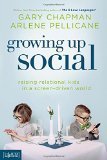 Adapted from Growing Up Social: Raising Relational Kids in a Screen-Driven World by Arlene Pellicane and Gary Chapman. If you’ve ever felt like screens are taking over your family, or as if your children are losing the ability to have real-life relationships, you need to read Growing Up Social today! Reclaim your family. Don’t sacrifice it to a screen!
Adapted from Growing Up Social: Raising Relational Kids in a Screen-Driven World by Arlene Pellicane and Gary Chapman. If you’ve ever felt like screens are taking over your family, or as if your children are losing the ability to have real-life relationships, you need to read Growing Up Social today! Reclaim your family. Don’t sacrifice it to a screen!
Arlene Pellicane is a speaker and author of 31 Days to Becoming a Happy Wife. She has been featured on the Today Show, Family Life Today, K-LOVE, and The Better Show. She lives in San Diego with her husband James and three children. Visit Arlene at www.ArlenePellicane.com for free family resources including a monthly Happy Home podcast.

The post Something a Screen Can’t Do: Hug Your Child appeared first on To Love, Honor and Vacuum.
Related posts on To Love, Honor and Vacuum:
 The Right to Act Like Your Child’s Parent
The Right to Act Like Your Child’s Parent The Wild Child
The Wild Child Is Screen Time Robbing Your Marriage?
Is Screen Time Robbing Your Marriage?



October 8, 2014
Marriage Box
When I got married 13 years ago we were given a beautiful wooden box with this poem, Marriage Box, written in it.
This box truly has been an inspiration to me in my marriage. Marriage truly is like an empty box. Many people get married for all the wrong reasons and have an abundant of expectations when they get married, I was one of them. I thought marriage was going to be filled with all sorts of companionship, sex, love, romance, intimacy, prayer, Bible studies, understanding, deep friendship and love. Boy, was I wrong.
I found out that marriage truly is empty unless you are infusing into it daily.
The truth is marriage at the start is in fact like an empty box. There really is nothing in it at the beginning. All the things you look for in marriage is really what is in the other person and it is up to both of you to infuse those things into your marriage lest it become an empty box. You can not day after day take out of your box if you don’t put something in it to withdrawal from. It reminds of a bank account. You can not keep spending and withdrawing money from your bank account if you have not deposited any money into it. If you attempt to do so, you will find your account over drawn and eventually the account will need to be closed because you were irresponsible and unable to maintain it.Early on in my marriage I would complain about my husband not being romantic enough, affectionate enough, serving enough, loving enough, not spiritual enough etc.
I remember being reminded daily as I saw the wooden box sit on our bedroom dresser, that marriage was like an empty box. As I complained about how “empty” my marriage felt and how lonely I felt, God showed me that it was because I was withdrawing more than I had deposited. I was in the “negative” so to speak.
I remember calling my husband during the day frustrated and overwhelmed with homeschooling and housework. I’d want him to drop all he was doing to pray with me, I had no consideration that he was working nor did I care that he didn’t need the added stress. To top it off when he would get home, dinner wouldn’t be ready, I’d have him make dinner because after all I had been with 5 children all day. I wanted him to rub my feet while I relaxed, I was very selfish always wanting to be served, even sex became all about me and my needs. I was taking so much out our marriage box and would rarely deposit anything in it. If I did manage to make a deposit I was sure to take out my portion before my husband took out a with-drawl.
I would daily look at that box and it would serve as a reminder to daily pour into my marriage.When I would take out, there was a sense of entitlement, after all I had infused whatever I took out into my marriage so I had every right to take out my fair share.
I remember keeping a running tab and account on how much my husband was infusing and putting it.
It was terrible. Can you imagine the kind of wife my husband had to endure? Just thinking about how I behaved makes me sick.I remember if he wanted to be intimate sexually, I would check our marriage box to see if he had infused romance lately and it had to be in the form that I approved. If he didn’t read or pray with me, then he had no right to to tell me how to behave spiritually. If he didn’t listen to me then I wouldn’t listen to him.
Our marriage became this you scratch my back, I’ll scratch your back kind of love. The only problem, I was so quick to point out when he wasn’t scratching my back and therefore I would withhold scratching his.
How horrible to live this way. I was so judgmental, always pointing out his faults/failures as a man and leader of our home. We both were miserable.
I knew the scriptures, Love the Lord your God with all your heart, mind, soul and strength and love thy neighbor as thy self.
You see, It was not a love issue for me, I loved my husband. I loved him the same way and as much as he loved me.
Until one day, I was reading and the words of Jesus to His disciples really penetrated my heart so deep. They were the words in John 13:34-35 “A new commandment I give unto you, That ye love one another; as I have loved you, that ye also love one another. By this shall all men know that ye are my disciples, if ye have love one to another.”
I was hit with the pondering truth of the love of Jesus.
Jesus was calling me to a different kind of love, a gospel kind of love. If I was going to love my husband the way Jesus said to, then I would need to think about how he loved me.
This led me to the cross. The cross is where love was demonstrated and ultimately on display for all to see. While we were yet sinners Christ died for us. Scarcely, would one die for a righteous man but Jesus laid his life down willingly for the joy that was set before him.
He showed us what love is. He loves without condition, without reservation, and without wanting anything in return. His love is unconditional. This is gospel centered love.
Jesus love isn’t a if you do this or that then I will love you, but rather nothing can separate us from the love of God neither death, nor life, nor angels, nor principalities, nor powers, nor things present, nor things to come, Nor height, nor depth, nor any other creature, shall be able to separate us from the love of God, which is in Christ Jesus our Lord.
What a glorious love indeed. I remember after reading and thinking about the way Jesus loved me the next question was this, “Is this enough for me?” Was the way Jesus loved me enough to compel me to love my husband the same way, or would I continue to love my way, the way I had been, the if you scratch my back, I’ll scratch your back kind of way? Was Jesus enough for me?
This is what it boils down to in marriage, it isn’t about putting in–in order to take out. It isn’t about serving to be served, loving to be loved, nor giving to get.
It’s about sacrificially laying down your life, saying my life is yours.
Marriage represents Christ and the Church, we wives represent the bride of Christ to an unsaved world. Therefore, the way we love our husbands shows the world our love to Christ.
The gospel in marriage changes our attitudes from a serve me attitude to a glorify God and love my spouse attitude.
The gospel is enough and until Jesus satisfies you, you will continue to love selfishly.
Darlene Lopez I am
a wife of 13 years, mother to 5 (including a set of twins), keeper of my home but most of all I am a blood bought saint. By the grace of God I am raising a generation of future homemakers and men. I am passionate about herbalism/natural living and love to inspire and motivate other homemakers to love their husbands and chidlren. I am learning that I am more sinful than I ever knew yet more loved than I ever imagined. You can read more about my journey at http://homemakingforrealwomen.blogspot.com/.
Now it’s your turn! What marriage thoughts do you have for us? Just enter the URL of your marriage post in the linky below!

Marriage isn't supposed to be blah!
Sex is supposed to be stupendous--physically, emotionally, AND spiritually.
If it's not, get The Good Girl's Guide to Great Sex--and find out what you've been missing.

The post Marriage Box appeared first on To Love, Honor and Vacuum.
Related posts on To Love, Honor and Vacuum:
 How to Reset a Bad Marriage Day
How to Reset a Bad Marriage Day Wifey Wednesday: What Does Submission in Marriage Mean?
Wifey Wednesday: What Does Submission in Marriage Mean? A Testimony of Marriage, Anorexia, and Healing
A Testimony of Marriage, Anorexia, and Healing



October 7, 2014
Top 10 Things I Want to Teach My Teens About Sex
Yesterday we talked about how to talk to your younger kids about sex. Today’s guest post from J at Hot, Holy & Humorous offers some great advice for parents of older kids–how to begin, KEEP the conversation going and how to teach your teens about sex.
“Hey kids, gather around and let’s talk about sex!” No, of course, I don’t approach my teens that way. Instead, we have an ongoing conversation about sexuality in my home, because I want my kids to be well-informed, well-armed, and also well-excited about sex when done the right way.
As we raise our teens, here are ten things I want them to learn about sex:
1. God created sex, so it’s good.
Sometimes in our quest to get across the message that sex before marriage is bad, we communicate that sex itself is bad. But it’s not. Sex according to God’s design is a wonderful thing—a beautiful gift—and I want my kids to have that foundational belief.
2. You can always talk to me about this topic.
One of my kids asked me a question about something mentioned at school, but prefaced that friends had warned him not to ask a parent because he might get in trouble. Thankfully, I’ve made it clear my kids can ask me anything about this topic. It’s not taboo. God created sex, He talked about it (the good and the bad), and He put parents in charge of instructing kids. I tailor my answers to age and context and so on, but my door is open for tough topics. It’s part of the parent job.
(By the way, that question was about condoms. The friends had erroneous information, and because he asked, I got to provide better information, along with our biblical values.
3. Pregnancy and STDs aren’t the only consequences for premarital sex or promiscuity.
These concerns get drilled into teens’ heads so much. Many believe the worst, or only, consequences of having sex before marriage or having multiple partners is unwanted pregnancy or contracting an STD.
Yes, kids, those things could happen, but the scars left on your heart, the disruption to your future marital happiness, the disobedience to God—these matter so much. They may be intangibles right now, but in time poor choices can wreak havoc on your life. So make the right choice.
4. Birth control is not 100% effective.
Speaking of which, many expect to dodge an undesired pregnancy with birth control. Sure, we have some great contraceptive methods that couples have used successfully. But I could also sit down and make you a list of couples I know who got pregnant while using contraception. If a birth control method is 99% effective, that means that 1 time out of 100, you’re on your own. So don’t rely on it, and only make love in the context that could properly support a child (aka marriage).
5. Sex is more than intercourse.
What constitutes sex? Is it merely intercourse? Is foreplay fair game? When I was a teen, the phrase “technical virgin” meant you’d done just about everything else, yet considered yourself a virgin because you hadn’t done “the deed.”
I look back and think how utterly stupid that perspective was! Sex is the whole kit-and-caboodle. If you’re getting the least bit naked to do something with someone, welcome to the world of sex. Even purveyors of porn and erotica know this, so we really have no excuse. I want my kids to understand sex isn’t everything but, and that sex encompasses far more than intercourse.
(By the way, this is good news for their future marriage. There could be times when intercourse is unavailable, but they won’t have to give up being intimate with their spouse!)
6. “How far is too far?” is the wrong question.
However, that’s the question youth workers hear again and again when the topic of sex is brought up with teens. Teens want to know where the line is—how far can they go without sinning or risking consequences. It’s basically, “What can I get away with?” Which is not the attitude God wants us to have toward Him or His gift of sexual intimacy.
Rather, we should ask, “How can I honor God when it comes to sexual intimacy?” Framing it that way, some of our nitpicking questions simply go away, and it becomes clearer what we should and shouldn’t do.
7. If you mess up, it’s not over.
Activities such as dabbling in online pornography, chatting promiscuously in a chat room, going much too far on a date, engaging in premarital sex—yes, they are bad, but they definitely don’t make the unforgiveable list.
Messing up doesn’t mean it’s all over… and you might as well give in, and God’s already mad at you so what’s the point, and you have to hide your ugly stuff or people will know how bad you really are, etc. No, no, no! If you fail at some point, God’s grace and healing can cover our sins and both He and your parents are here to help you get back on track.
8. The Bible has a lot to say about sexuality.
It’s easy for kids and teens, and plenty of us adults, to feel that a book written thousands of years ago has little bearing on our modern-day challenges. After all, where are the verses about sexting and 50 Shades of Grey and the hookup culture?
But the Bible is relevant. There are direct stories of sexual sin and sexual love, as well as many verses about guarding our hearts, measuring our actions, and honoring others. If God’s Word is true, it permeates every aspect of our life, including the bedroom. You can’t compartmentalize, believing that “loving your neighbor” has nothing to do with treating that girl or boy in your arms with respect. So if you want to know the real deal about how we should approach sexuality, read the Bible.
9. More sex happens in marriage than outside it.
One might think it’s the opposite based on media, entertainment, and conversations. But studies show that married couples are getting more, and more satisfying, sex. If kids think the sex well is going to dry up the second they say “I do,” they’ll buy into the sow my wild oats theory before marriage, or put off marriage for fear of their sex drive going unheeded.
But I love what one newlywed man told our youth group: “I’m having lots of sex now, and I never, ever think, ‘Man, I wish I’d had sex back in high school.'” It’s kind of like Christmas, kids: It takes a while to get here, but the gift you receive is worth the wait.
10. Your parents love each other—yes, even in the bedroom.
My kids are well aware that marriage includes sexual intimacy, because they see it hinted at with their parents. Of course, they don’t have details, because that aspect of our relationship is private. But they see us flirt and display appropriate affection in front of them, and they know the bedroom door gets closed and locked at times.
They might roll their eyes at our hugs or kisses, but they also smile. It’s reassuring to know their parents love each other and that marriage, even as long as we’ve been married, includes true passion.
What do you want your teens to know about sex? Which tip speaks most to you (for me it’s #6!)? Let me know in the comments!
J. Parker is the author of Sex Savvy: A Lovemaking Guide for Christian Wives and writes the Hot, Holy & Humorous blog, where she uses a biblical perspective and a blunt sense of humor to foster Christian sexuality in marriage.

The post Top 10 Things I Want to Teach My Teens About Sex appeared first on To Love, Honor and Vacuum.
Related posts on To Love, Honor and Vacuum:
 How to Keep a Healthy Sex Life with Teens in the House
How to Keep a Healthy Sex Life with Teens in the House Make Talking to Your Teens About Sex Low-Stress
Make Talking to Your Teens About Sex Low-Stress Is Church Youth Group a Mission Field? Christian Teens Need a Safe Place, Too
Is Church Youth Group a Mission Field? Christian Teens Need a Safe Place, Too



October 6, 2014
Reader Question: How Do I Talk To My Kids About Sex?
 This week I’m going full throttle, doing the final edits for my upcoming book, 9 Thoughts That Will Change Your Marriage. So I’ve asked some awesome friends to guest post for me. And I thought I’d start with this week’s Reader Question about talking to your kids about sex. A mom wrote in and asked:
This week I’m going full throttle, doing the final edits for my upcoming book, 9 Thoughts That Will Change Your Marriage. So I’ve asked some awesome friends to guest post for me. And I thought I’d start with this week’s Reader Question about talking to your kids about sex. A mom wrote in and asked:
I have an 3 kids under 8. We have had conversations about aspects of the relationship between men and women, how babies come out of the women’s body (not yet talked about how they get in there in the first place though) and other things like that. But we have not yet talked about the actual act of sex. I’ve heard reports that you need to have this conversation with your kids between the ages of 7-9, after that age they will have most likely gotten the information from friends or stumbling across it online.
So my question is, how do you start this conversation? I am very comfortable talking about sex with adults, but my 8 year old son is a whole other area! So I thought i’d see if you had any thoughts or advice on how you may have done this with your kids. Thanks so much!
Great question! And so I’ve asked Luke Gilkerson, from Intoxicated on Life, who has just come out with a book on this very subject to chime in. Here’s Luke:

“Why is my penis so big?”
This was the way my five-year-old greeted me one morning. Though he probably had experienced an erection hundreds of times before this, for some unknown reason, on that morning it confounded him. I explained to him, “That’s called an erection. Your penis is supposed to do that from time to time. There are special blood vessels in your penis that fill up with blood and make your penis hard and straight.” In the flurry of morning activities, that was all that was said, and that seemed to satisfy his curiosity for the time being.
Children are sexual beings—not in the sense that they are mature enough for sex but in the sense that they have sexual anatomy and curiosities. Their gender defines something important about who they are. For that reason, teaching our kids about human gender and sexuality is an important piece of their education, even from a young age.
Anxieties About Sex
Ever since I released my parent-child Bible study about sexuality, The Talk, I’ve received questions from many parents—some of them filled with questions and anxiety—about how talk to young kids about sex. I understand this anxiety. For many of us, sex has either burned us in the past or we were raised in a world where sex was never discussed. We remember the angst of puberty, first crushes, first kisses, discovering masturbation, discovering pornography, and perhaps specific sexual sins we regret. Sex is not a topic some relish talking about.
In some sense, the fear of talking about sex with our kids is normal because we know sex is a powerful force, and whatever we say to our kids about it, we want to say right.
Too Much Too Soon?
Some parents fear saying too much too soon to their young children. Won’t these conversations spark sexual curiosity in them too early?
I think it is important to dissect the question a bit.
First, what is meant by “sexual curiosity”?
Second, what is meant by “too early”?
For some parents, curiosity about sex, especially in children, is seen as somehow dirty. For these parents, sexual curiosity is intimately linked to sexual sin. In reality, this is far from the truth. Sexual curiosity includes a wide variety of interests: curiosity about sexual anatomy (one’s own and that of the opposite sex), curiosity about how babies are made and grow, curiosity about romance, and curiosity about sexual intercourse are all as natural as the day is long. None of these curiosities is an indicator of an unhealthy or premature desire to have sex.
Furthermore, the fear that we might initiate conversations about sex “too early” is often based on the assumption that our kids are living in a sexual vacuum. This is far from the truth. Kids are coming home from the playground learning about oral sex at age 6. Kids are seeing sexual themes in video games, TV advertisements, and in the grocery store checkout aisle. Even if you take away the overtly sinful examples, kids hear about sexual themes in the midst of wholesome activities all the time: listening to a sermon, watching you and your spouse kiss, and even reading the Bible. The reason why you, as a parent, need to start conversations about sex now is because you have the opportunity to shape and mold what they are already picking up from the environment they’re in.
You will not rob a child of his or her innocence by giving them biblical and biological information about sex. Focus on the Family’s Complete Guide to Baby & Child Care says it well:
Giving a child facts about reproduction, including details about intercourse, does not rob him of innocence. Innocence is a function of attitude, not information. A school-age child who understands the specifics of sex, while seeing it as an act that, in the proper context, both expresses love and begins new life, retains his innocence. But a child who knows very little about sex can already have a corrupt mind-set if he has been exposed to it in a degrading, mocking, or abusive context.
Talking to Young Kids About Sex (Ages 4-7)
1. Get used to it.
I have a friend who routinely speaks to groups of parents at churches addressing hot-button sexual issues like pornography. He’s a dynamic speaker and well-loved by all the audiences he addresses. He gets one complaint everywhere he goes, however: “It was a little uncomfortable when you said words like ‘testicles’ and ‘clitoris.’ Next time you do this talk you should really censor some of your words.” Good grief. If you can’t get together in a room with other adults—adults who have all chosen to gather in a room to hear a talk about pornography—and you can’t stand to hear basic anatomy terms, no wonder you can’t talk to your kids about sex.
For some, sex is embarrassing. They can’t picture saying words like “penis” and “vagina” in the same sentence—let alone talking about how they go together.
If this is you, you have three choices: push through the awkwardness, get comfortable with it, or be silent. If you don’t speak, the world will be more than happy to fill the void.
2. Teach it like you would any other subject: according to what they can grasp
You need to talk to your kids where their cognitive abilities will allow them to go. For the same reason you don’t teach your child their times tables at age 4, you also don’t have a long chat with them about the birds and the bees at age 4. Toddlers are in what is called the preoperational stage of child development. Though their language skills are maturing, they do not have logical reasoning skills. They think very concretely. Concepts like cause and effect are unknown to them.
During this stage of life, talks about sex should be brief and very concrete. My brief conversation with my son about his erection is an example of this. It was not a no-holds-barred everything-you-need-to-know conversation. It is about giving them little bits of information about sexual biology and sexual norms over time. Sometimes, time will permit you to have longer conversations, but remember to keep things focused on one subject at a time.
3. Teach it like you would any other subject: progressively over time
Don’t feel the need to have a single talk about everything sexual. Not only would this take far too long, these conversations and themes work best when they are repeated over and over, progressively over the course of a child’s life. In the early phases of life (0-3), give them correct labels for their body parts and confidence that their bodies are created by God. As they start to notice gender differences, explain some of the obvious outward differences between boys and girls. Affirm them in their gender identity. Help them practice modesty. Model how your child should joyfully react to things like pregnancies and weddings.
As your child gets older (4-8), you can unpack more information about human reproductive organs (male and female). Model the importance of privacy when it comes to nakedness. Warn them from time to time about pornography: tell them that if they see images, cartoons, photos, or videos that show naked people that is not healthy to see. Especially as they get closer to 1st and 2nd grade, children start to enter a new phase of development where they can reason more logically and can start to understand things from another’s perspective more easily, making more detailed conversations much easier.
These do not need to be sit-down, fire-side chats, but they can happen in the context of daily life as questions are asked or opportunities arise.
4. Let the Bible break the ice for you
For more formal discussions about sex, the best context is during conversations about the Bible.
First, get into the habit of opening the Scriptures together as a family, reading from the Bible, praying together, and talking biblical truths. This is Christian Parenting 101: establish a routine in your home that communicates the importance of the Bible to our understanding about God and human beings.
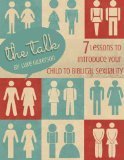 Second, use specific passages from the Bible to break the ice on these sexual topics. I recommend texts like Genesis 1:24-31, 2:18-25, Exodus 20:14; Psalm 139:13-18, and 1 Corinthians 6:18-20. These texts cover major themes like the creation of male and female, the command to procreate, the mystery and beauty of life in the womb, the evil of adultery and sexual sin, and the importance of honoring God with our bodies.
Second, use specific passages from the Bible to break the ice on these sexual topics. I recommend texts like Genesis 1:24-31, 2:18-25, Exodus 20:14; Psalm 139:13-18, and 1 Corinthians 6:18-20. These texts cover major themes like the creation of male and female, the command to procreate, the mystery and beauty of life in the womb, the evil of adultery and sexual sin, and the importance of honoring God with our bodies.
If you need help with this, my family Bible study, The Talk: 7 Lessons to Introduce Your Child to Biblical Sexuality, gives you a script to walk through these texts with a child
5. Let real life break the ice for you
Sometimes the most natural conversations about sex happen in the context of real life—all the way from the very wholesome or mundane to the perverse.
Some kids are naturally inquisitive and will be forward about their questions, like, “How do babies get in your belly?”
If you are around farm animals or wildlife, or if you have pets, your kids might catch animals “in the act.”
If your pastor preaches something with a sexual theme, your child might become curious about what is being taught.
If you see a pregnant woman, you can always stoke their curiosity about how God makes a baby grow in the womb.
If your child sees something inadvertently on TV or in a movie that has a sexual theme, don’t be silent. Ask them, “What’s wrong about the way they are portraying this?”
If your child comes home from school or a play date and relates some bad information he heard about sex from one of his friends, take time to correct the error.
Encouragement to Parents
The book of Proverbs, written especially for the young, warns its readers many times about the seduction of lust and easy sex. But the readers are promised they can avoid the snare of sexual sin. How?
…keep your father’s commandment,
and forsake not your mother’s teaching.
Bind them on your heart always; tie them around your neck.
When you walk, they will lead you;
when you lie down, they will watch over you;
and when you awake, they will talk with you. (Proverbs 6:20-22)
Be encouraged. Your words have power. Your commands are life giving. Your teachings are critical. In years to come, the echoes of your voice will watch over your children even in the darkest corners of temptation.

 Luke Gilkerson is the Educational Resource Manager at Covenant Eyes, where he teaches others about staying pure online. He blogs about adventures in parenting at IntoxicatedOnLife.com with his wife Trisha.
Luke Gilkerson is the Educational Resource Manager at Covenant Eyes, where he teaches others about staying pure online. He blogs about adventures in parenting at IntoxicatedOnLife.com with his wife Trisha.
You can buy his book, The Talk: 7 Lessons to Introduce Your Child to Biblical Sexuality, on Amazon in paperback or get a digital version in his online store.
The post Reader Question: How Do I Talk To My Kids About Sex? appeared first on To Love, Honor and Vacuum.
Related posts on To Love, Honor and Vacuum:
 Reader Question: How Much Do I Tell My Kids About My Past?
Reader Question: How Much Do I Tell My Kids About My Past?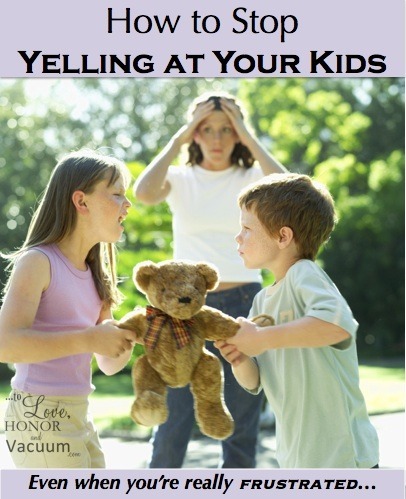 Reader Question: How Do I Stop Yelling at My Kids?
Reader Question: How Do I Stop Yelling at My Kids?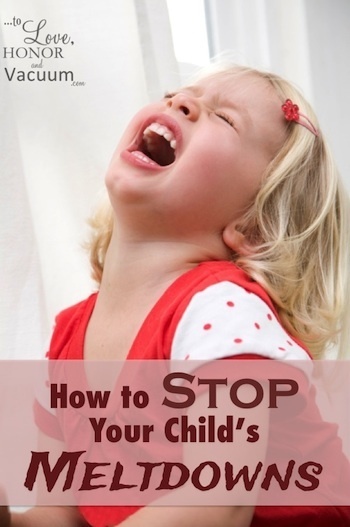 Reader Question: How Do I Stop My Child’s Meltdowns
Reader Question: How Do I Stop My Child’s Meltdowns



October 3, 2014
Do We Need to Stop Using the Term Virgin?
 “If you get raped, does that mean you’re not a virgin anymore?”
“If you get raped, does that mean you’re not a virgin anymore?”That was one of the anonymous questions asked at a small group my 17-year-old daughter was a part of this summer. The adults leading the discussion hemmed and hawed, saying technically, they guessed, you weren’t a virgin.
My daughter, worried that one of the girls in this group had actually gone through this and was in agony, piped up. “It’s not the physical that’s important to God. It’s the heart. And God looks at the heart, and He can heal you and still give you a wonderful pure marriage.”
She’s heard me talk about this a lot around the table, and she’s quite passionate about it.
But this was one of a string of things that I’ve heard of lately that make me think that we need to change the way we talk about sex. This is the last of a 3-part series I’ve written on how I wish Christians could reframe the way we talk about modesty and purity. Today I want to talk about purity, the word “virgin”, and how we’re emphasizing the wrong thing. Unfortunately, for this conundrum I don’t have a clear answer; I just see the problem. I hope, after reading this, that you all can help brainstorm with me and find a new way to talk about purity instead of emphasizing virginity.
So let’s start with first principles:
God made sex to be a beautiful, wonderful thing.
It is also meant to be experienced within marriage. It’s also only in marriage that sex can reach its full potential, because sex is supposed to be intimate not just physically, but emotionally and spiritually as well. You can’t feel “like one” if there is no commitment. So sex is supposed to be beautiful and passionate, and marriage was created to be the environment for that passion.
I hope that’s clear–God does want us to wait for marriage for sex. Absolutely no doubt about that. And He wants us to do so for very good reasons. That’s why we say that God wants us to stay virgins until we’re married. However, I’m not sure that saying “God wants you to be a virgin when you’re married” always gives the right message. Here’s why:
1. You Can Be “Impure” and Still Be a Virgin
When we stress virginity as the sign of acceptance by God and the church and obedience to God, then we inadvertently say that “anything up to that point goes”. Of course, no youth pastor or parent would say that’s their message, but it is one some young people hear. One friend of mine, now 45, told me that he was 22 years old before he realized that heavy petting was actually not okay.
We need to talk not only about sex but about everything sexual. If all we ever say about sex is “don’t have sex until you’re married”, then you haven’t explained why purity isn’t about making sure that you’re a technical virgin; purity is an attitude of the heart. And you haven’t talked about the fact that other things can be sexual as well, and should be saved until marriage. We simply need to open lines of communication.
2. You Can Be Pure and Not Be a Virgin
In the surveys that I did leading up to the launch of my book The Good Girl’s Guide to Great Sex, I asked people about their sexual experience before marriage. Then I left a box where people could write anything they wanted to say. I didn’t prompt them, but over 35% of women who weren’t virgins when they were married volunteered that they wished that they had waited. It really wore on them.
I so want to say to these women that God’s healing is available to them. You are not the sum of what you have done with your body; your identity is about what Jesus did with His body for you. And God takes our filthy rags and makes them new. He restores!
If you look back at the Gentile New Testament church, it was filled with people who were mostly NOT virgins when they were married. The Jewish culture protected chastity, but the Roman culture did not. When Paul was saying things like this, in Ephesians 2:1-5:
As for you, you were dead in your transgressions and sins, 2in which you used to live when you followed the ways of this world and of the ruler of the kingdom of the air, the spirit who is now at work in those who are disobedient. 3All of us also lived among them at one time, gratifying the cravings of our flesha and following its desires and thoughts. Like the rest, we were by nature deserving of wrath. 4But because of his great love for us, God, who is rich in mercy, 5made us alive with Christ even when we were dead in transgressions—it is by grace you have been saved.
When he said that the people in Ephesus had “gratified the cravings of our flesh and followed its desires and thoughts” he meant it. Ephesus was a haven for temple prostitution. We think we live in a sexual culture, but so did they! These early Christians had quite the background, but they also were so grateful that Jesus had made them pure.
Because everyone in those days came to Christ as an adult, after they had messed up earlier, they could celebrate Jesus’ forgiveness perhaps easier than we do because most of us were raised in the church and then messed up. And so we carry great shame. Maybe we need to identify more with these Ephesian Christians and stop beating ourselves up, but be grateful for what Christ has done for us!
3. Stressing virginity makes it sound like once you’ve failed, there’s no point in even trying anymore.
A few weeks ago a friend of mine in the military, who had been transferred to another base, crashed at my house for a few days with his wife and 21-year-old daughter as they were moving across Canada. During one of our conversations (don’t you love catching up with old friends?), my friend told me about one of her daughter’s friends who wasn’t a Christian. That girl had decided that she wanted to be a virgin when she was married all on her own, which is great.
But then one day she and her boyfriend got carried away and her virginity was gone.
She realized that she had lost her dream–to wait until her wedding–and so now there was no point. The horse has left the gate. You can’t close that door now.
I wonder how many people, both inside and outside the church, feel that same way. They want sex to be special and to be saved, but then if they mess up, they figure there’s no point in trying to reclaim any kind of boundaries, because you’ve already completely blown it.
When we stress virginity, then once it’s gone, it’s gone.
4. Stressing virginity makes purity legalistic
And that’s essentially my problem. Talking about virginity makes the issue a physical one, not a heart one.
God cares about the heart, not the hymen.
Of course, for our own sakes and for the sake of righteousness He wants us to wait until we’re married. But what He wants even more than that is people coming to Him with a pure and eager heart for a real relationship with Him. He looks to the heart (purity) not to outward appearances (the hymen). And you can have purity when you come back to God.
Listen, I still want my girls to be virgins when they’re married. Absolutely. But I just wonder if by using that word we’re stressing the wrong thing.
I really and truly don’t have an answer for this one. I would prefer to stress purity over virginity, but I’m not sure that’s a good answer, because “purity” has a bad ring to it in the wider culture, too. It sounds judgmental (though I don’t mean it that way. Our purity, after all, is not from our behaviour. It’s from what Christ has done for us).
I know this has been a heavy week. I’ve talked about how the modesty message can mess up women’s body image, and how the purity culture (the one that says that you can’t do anything other than hold hands before you’re married) can mess up our view of sex. And now I’m talking about how perhaps the word virgin is being used wrongly. I don’t mean to criticize the church, and I also don’t mean to demean modesty, purity, or virginity–all of which are important.
I just want to make sure that we’re stressing heart things and we’re pointing to sex the way that God intended. I think the time has come to have this discussion–with your youth pastor, with teens you know, with engaged couples–and start to reframe things.
As part of that discussion, then, let me ask you: how would you handle the virginity/purity issue? How would you frame it? Let’s talk! Just leave a comment below.

Marriage isn't supposed to be blah!
Sex is supposed to be stupendous--physically, emotionally, AND spiritually.
If it's not, get The Good Girl's Guide to Great Sex--and find out what you've been missing.
The post Do We Need to Stop Using the Term Virgin? appeared first on To Love, Honor and Vacuum.
Related posts on To Love, Honor and Vacuum:
 Is The Purity Message Making Women Ashamed of Sex?
Is The Purity Message Making Women Ashamed of Sex? Reader Question: I Want to Stop Sleeping with My Boyfriend, But What if He Won’t Marry Me?
Reader Question: I Want to Stop Sleeping with My Boyfriend, But What if He Won’t Marry Me? What the Lena Dunham Ad Tells Us about Attitudes Towards Sex
What the Lena Dunham Ad Tells Us about Attitudes Towards Sex





